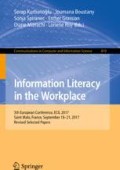Abstract
This paper first presents the information literacy competencies in both public universities and institutions of applied learning in Switzerland. Based on the project “Information Literacy at Swiss Universities” launched in 2011, it shows how the Swiss Standards of Information Literacy were designed and applied. These six standards have since been supplemented by related learning objectives. In the second part, the author will answer the question formulated in the title in order to understand if those standards reflect the reality of the job market and the workplace. Two case studies, one at the University of Geneva and the other at Ecole hôtelière de Lausanne in Switzerland (where the author is presently working) are given. In conclusion, he analyses the reasons behind such a gap and proposes several solutions to bridge the gap. Solutions do exist and information professionals hold the key to unlocking information literacy.
Access this chapter
Tax calculation will be finalised at checkout
Purchases are for personal use only
Notes
- 1.
- 2.
According to official data from the University of Geneva: https://www.unige.ch/stat/fr/statistiques/chiffresetudiants/.
- 3.
- 4.
The Schmidheiny Foundation funded these renovations: http://www.fondation-schmidheiny.ch/lafondation.html.
- 5.
“The Library of the UNIGE” is the entity that covers eight specialised libraries under the authority of the Department of Scientific Information (DIS). It contains multiple sites throughout Geneva.
- 6.
- 7.
- 8.
- 9.
These criteria are set by the US organisation NEASC (New England Association of Schools Accreditation): https://www.neasc.org/.
- 10.
- 11.
- 12.
Cited in: https://fr.linkedin.com/pulse/combien-de-temps-perdu-%C3%A0-la-recherche-dinformation-c%C3%A9dric-frickert, published 15 May 2017 by Cédric Frickert: “According to a report published by McKinsey, employees spend 1.8 h per day, 9.3 h per week, on average, searching for and gathering information.” “Source: Time Searching for Information”. Other sources:
• 19.8% of the time of the activity – the equivalent of one day per week of work – is wasted by employees by employees in search of information to do their jobs efficiently; 1/5 of business time is lost looking for information. “Source: Interact”.
• A recent webinar provided an interesting statistic by Outsell: the time spent by a manager in search of information has increased 28% since 2002. “Source: IHS Knowledge Collections”.
• A new poll revealed that workers needed eight searches to find the right document and information. “Source: SearchYourCloud”.
• IDC data shows that “workers spend around 2.5 h every day, or about 30% of the work day, looking for information... 60% of corporate managers estimated that time constraints and incompetence in searching for information prevented their employees from finding the info they need. “Source: Information: The Lifeblood of the Enterprise”.
- 13.
References
Catts, R., Lau, J.: Towards Information Literacy Indicators. UNESCO, Paris (2008). http://www.uis.unesco.org/Library/Documents/wp08_InfoLit_en.pdf
Bundy, A.: Australian and New Zealand Information Literacy Framework. Australian and New Zealand Institute for Information Literacy (ANZIIL), Adelaide (2004)
Association of College and Research Libraries (ACRL): Information Literacy Competency Standards for Higher Education. Association of College and Research Libraries, Chicago (2000)
Acknowledgments
Translation: Andrew Brenner, Ecole hôtelière de Lausanne (Switzerland). Graphics: Christine Walker, Information Specialist, Ecole hôtelière de Lausanne (Switzerland).
Author information
Authors and Affiliations
Corresponding author
Editor information
Editors and Affiliations
Rights and permissions
Copyright information
© 2018 Springer International Publishing AG
About this paper
Cite this paper
Accart, JP. (2018). Information Literacy (IL) in the Academic Context: Is There a Gap Between Employability Competencies and Student Information Literacy Skills?. In: Kurbanoğlu, S., Boustany, J., Špiranec, S., Grassian, E., Mizrachi, D., Roy, L. (eds) Information Literacy in the Workplace. ECIL 2017. Communications in Computer and Information Science, vol 810. Springer, Cham. https://doi.org/10.1007/978-3-319-74334-9_12
Download citation
DOI: https://doi.org/10.1007/978-3-319-74334-9_12
Published:
Publisher Name: Springer, Cham
Print ISBN: 978-3-319-74333-2
Online ISBN: 978-3-319-74334-9
eBook Packages: Computer ScienceComputer Science (R0)

